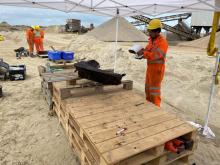Three winners of the
Mark Russell, director BMAPA, said: “Staff working in the marine aggregate industry, at wharves or on board dredgers, can encounter archaeological finds during their day to day work, so the existence of a reporting protocol is critical to ensuring any items of potential interest are reported consistently. Their vigilance ensures that any finds of potential archaeological importance discovered during all the UK marine aggregate industry’s operations, can be reported to heritage experts so their significance can be assessed. In turn, these discoveries can result in mitigation measures to be introduced on production licence areas to protect previously unknown sites of importance, for example aircraft crash sites.”
Commenting on the awards, Chris Pater, head of marine planning at English Heritage, said: “The year-on-year support from marine minerals industry is greatly appreciated and demonstrates how we are all working effectively together. These awards directly recognise how we can all contribute to our understanding of the past by reporting what might be found at wharves or while at sea.”
The 2014 BMAPA annual Archaeology Award winners are:
Best Attitude by a Wharf,
Staff at the wharf have reported an astounding number of finds during the nine years of the Protocol being in place, and take a keen interest in the protection of our heritage. In the year 2012/13 they reported a range of finds linked to a downed Luftwaffe aircraft thought to lie in or around a licence area on the South coast. The discovery of the first finds prompted staff to be extra vigilant when checking cargoes that had been delivered which led to the discovery of further material.
Best Attitude by a Vessel,
The crew of the Arco Arun reported the most number of finds discovered by vessels during the 2012/13 reporting year.
Most Significant Find, Lafarge Tarmac's Bedhampton Wharf:
A pewter medical syringe used to treat ailments in men thought to date from the late 1800s.
The archaeological reporting protocol was developed by BMAPA and English Heritage to enable archaeological finds, encountered during marine aggregate operations (either on board dredgers or at the wharves), to be reported. It continues to be delivered through an implementation service provided by Wessex Archaeology, and co-funded by BMAPA and The Crown Estate. The service allows finds recovered by industry staff to be identified and assessed for their significance by heritage experts and, where necessary, for appropriate mitigation to be introduced on production licence areas to protect previously unknown sites of importance.
Since the protocol was introduced in 2005, over 330 separate reports have been filed by marine aggregate industry staff (52 in 2012/13), covering over 1,000 individual items (c.120 in 2012/13). Finds reported range from animal remains from the Palaeolithic period, through maritime artefacts, cannonballs and aircraft remains.
The implementation service includes an annual report which details every find reported during the year, commenting on trends emerging over time. See: http://www.wessexarch.co.uk/projects/marine/bmapa/docs.html
To support the practical delivery of the protocol, an awareness programme to encourage its use amongst industry staff, working on both wharves and on the dredgers themselves, continues to be funded through a partnership approach between BMAPA, The Crown Estate and English Heritage. The programme involves site visits by maritime archaeologists to provide industry staff with the knowledge and confidence to identify and report items of potential archaeological interest that may be found amongst dredged cargoes, as well as the production of twice-yearly ‘Dredged Up’ newsletters.





